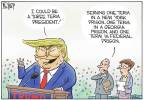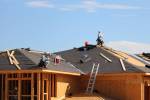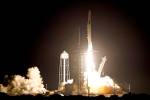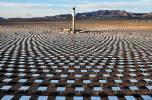Faraday selects North Las Vegas for electric car plant






CARSON CITY — Faraday Future has picked the Apex area in North Las Vegas for a $1 billion auto plant expected to start producing electric cars as early as 2017.
In a letter to state lawmakers that circulated Wednesday, Faraday financial backer Yueting Jia said: “We hope to bring our $1 billion investment to North Las Vegas and open our first manufacturing facility there, creating 4,500 jobs for the state of Nevada.”
Gov. Brian Sandoval on Thursday will announce the agreement at an 11 a.m. news conference at the Sawyer Building in Las Vegas.
Any deal will require a special session of the Nevada Legislature to approve a tax incentive package for the company. It is expected to start Dec. 16 and run at least through Dec. 18.
In his letter, Jia, a billionaire founder and CEO of Letv, a Beijing-based online video company often compared to the U.S.-based Netflix, indicated that while he didn’t want to reveal “details of my investment” in Faraday, he was compelled by state leaders to provide some information to lawmakers.
“There has been much interest and speculation surrounding the question ‘Who is backing Faraday Future?’ Due to the nature of competitive business strategies and trade secrets, we initially weren’t planning to share the details of my investment at this early stage. FF is a U.S.-based, global company focused on creating the next generation of seamlessly connected, intelligent electric vehicles and mobility solutions.
“I am not the only founder of FF,” Jia wrote. “Together with top global experts, we have created a partnership structure for decision making and management of FF. We are bringing together resources from the following four domains: Automotive, Technology, Internet and the cloud, Entertainment content.
“While I am personally backing FF, there is also a diverse funding strategy to help us fully realize our mission and vision,” he said.
Jia described Faraday as an international team with employees in 40 countries, a headquarters in Silicon Valley in Northern California, a research-and-development facility in suburban Los Angeles and other offices in Beijing and Dusseldorf, Germany.
Legislative critic
Legislators who meet in the special session are expected to address a package of tax incentives negotiated over several months between the Governor’s Office of Economic Development and Faraday executives.
But not all 63 lawmakers will be on board. In commentary Wednesday, Assemblywoman Shelly Shelton, R-Las Vegas, criticized the proposed deal, calling it another “welfare company” coming to Nevada.
“When the ‘investment’ in Faraday comes before us, the Legislature will likely fold like a cheap suit to the whims of the governor and will, once again, violate the Constitution, their oaths and the will of Nevadans by adding yet another welfare company to the state rolls,” she said. “Get prepared for the protests and cries of unfairness when the money runs out, just like solar companies are doing right now.”
Shelton has been a vocal critic of offering large incentives to companies willing to relocate to Nevada. Last year, lawmakers overwhelmingly approved $1.3 billion in tax incentives to land a $5 billion lithium-ion battery factory at the Tahoe Reno Industrial Park east of Reno. The factory is a joint venture between electric car-maker Tesla Motors Inc., headed by billionaire entrepreneur Elon Musk, and Panasonic Corp. It is critical to Tesla’s goal of mass producing electric cars that are affordable to the public.
Nevada has been rumored for months to be high on Faraday’s list of potential sites, which included locations in California, Louisiana and Georgia.
After months of silence, Sandoval and state economic development chief Steve Hill last month publicly acknowledged the ongoing negotiations and Nevada’s desire to clinch the deal.
“It’s a complex deal, and we have a number of people who have worked on this for approximately a year,” Hill said at the time.
Boon for NLV
Faraday’s planned 3 million-square-foot plant is seen as a boon for struggling North Las Vegas, the Southern Nevada region as a whole and Nevada’s mission to diversify its economy from one heavily dependent on service-oriented jobs to well-paid high-tech industries.
Officials believe it will serve as a catalyst to lure other companies to Apex, a 20,000-acre industrial park that sat largely vacant for years and has lacked important infrastructure such as water and natural gas. Measures passed by the 2015 Legislature could be used to help make that happen.
Robert Lang, director of the UNLV Brookings Mountain West Institute, has said Apex could generate $670 million in state and local tax revenue if fully developed.
Faraday Future burst onto the automotive scene over the summer, creating speculation simply by how much there was to speculate about. The company is based in Gardena, California, but has yet to name a CEO and has been secretive about the source of its capital.
But the company’s leadership team includes many former executives from rival Tesla. It includes Nick Sampson, senior vice president of research and development and engineering; Dag Reckhorn, vice president of global manufacturing; Alan Cherry, vice president of human resources; and Tom Wessner, vice president of supply chain.
The vehicle envisioned by Faraday would have enhanced technological features that have some observers describing it as “a smartphone on wheels,” but the company has yet to describe what some of those features would be.
Faraday officials have indicated they intend to reveal a concept before next month’s International Consumer Electronics Show in Las Vegas.
Review-Journal writer Richard N. Velotta contributed to this report. Contact Sean Whaley at swhaley@reviewjournal.com or 775-687-3900. Find him on Twitter: @seanw801. Contact Sandra Chereb at schereb@reviewjournal.com or 775-687-3901. Find her on Twitter: @SandraChereb


















